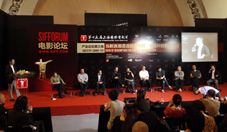Summit Forum Discusses Challenges from More Foreign Films

Famous Directors Discussing the Road of Redemption for Chinese-Language Film
The third Industry Summit film forum - "Road of Redemption for Chinese-Language Film" - was an in-depth discussion yesterday between award-winning Chinese directors, producers and distributors about the industry\'s immediate future.
The aim was to find the "road of redemption" in this "dangerous year," as described by director Guan Hu (2012\'s Design of Death ) and Lu Chuan (2009\'s City of Life and Death ).
The industry sees trouble looming with an influx of major U.S. films, increased from 20 percent to 34 percent a year in March, and foreign filmmakers keeping a bigger share - up from 13 percent to the 25 percent - of box-office takings.
"The year of 2012 is really dangerous," Guan told the forum at Shanghai Exhibition Center. "I may not be able to continue my work in the film industry."
His worry was shared by all directors at the forum, namely Jia Zhangke (Still Life, winner of the 2006 Golden Lion), Lou Ye (Suzhou River, Tiger Award winner at 1999\'s Rotterdam Film Festival), Wang Xiaoshuai (2001\'s Beijing Bicycle ), Wuershan (2012\'s Painted Skin: The Resurrection ), and Zhang Yuan (1997\'s East Palace, West Palace ).
"It is a challenge and danger for the entire Chinese film industry, not only to art house films, but also to commercial Chinese movies," Lu said.
"Let\'s just forget about the philosophical depth or artistic vision for a minute. As a film director, who doesn\'t have an artistic vision? But you just can\'t fight the Hollywood industry with that. We need a regularized industry to do that," he added.
Christian Jeune, Cannes Film Festival\'s director of film and deputy general delegate, offered comfort and encouragement to the filmmakers to confront the challenges. He cited the examples of the booming Korean film industry and the art house cinema in France.
Although complaining about the sudden pressure from Hollywood, Lu also viewed the challenge as a positive motivation to "force Chinese filmmakers to grow out of the overly protective environment they have got used to."







